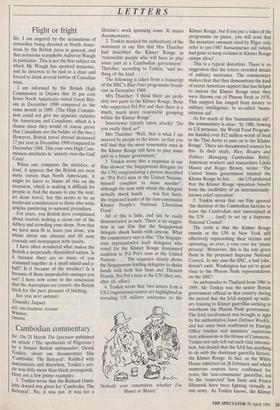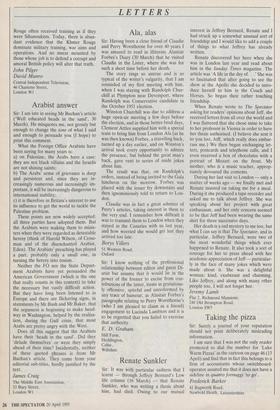Cambodian commentary
Sir: On 23 March The Spectator published an article (`The apotheosis of Pilgerism') by a former British ambassador, Derek Tonkin, about our documentary film `Cambodia: The Betrayal'. Riddled with Inaccuracies and distortion, Tonkin's arti- cle was little more than black propaganda. Here are a few prime examples: 1. Tonkin wrote that the Richard Dimb- leby Award was given for 'Cambodia: The Betrayal'. No, it was not. It was for a lifetime's work spanning some 30 major documentaries.
2. Tonkin mocked the authenticity of the statement in our film that Mrs Thatcher had described the Khmer Rouge as `reasonable people who will have to play some part in a Cambodian government'. Thatcher, according to Tonkin, 'said no- thing of the kind . . .
The following is taken from a transcript of the BBC's Blue Peter programme broad- cast in December 1988: Mrs Thatcher: `I think there are prob- ably two parts to the Khmer Rouge, those who supported Pol Pot and then there is a much, much more reasonable grouping within the Khmer Rouge.'
Interviewer (clearly taken aback): `Do you really think so?' Mrs Thatcher: `Well, that is what I am assured by people in the know, so that you will find that the more reasonable ones in the Khmer Rouge will have to play some part in a future government.'
3. Tonkin wrote that a sequence in our film showed 'the Singaporean delegate (to the UN) congratulating a person described as "Pol Pot's man at the United Nations, himself complicit in mass murder", although the man with whom the delegate actually shook hands . . . was Son Sann, the respected leader of the non-communist Khmer People's National Liberation Front'.
All of this is false, and can be easily demonstrated as such. There is no sugges- tion in our film that the Singaporean delegate shook hands with anyone. What the commentary says is this: 'The Singapo- rean representative leads delegates who voted for the Khmer Rouge dominated coalition to Pol Pot's man at the United Nations . . .' The sequence clearly shows the Singaporean leading delegates to shake hands with both Son Sann and Thiounn Prasith, Pol Pot's man at the UN (they are, after all, allies).
4. Tonkin wrote that `two letters from a US Congressional source are highlighted as revealing US military assistance to the 'Nobody ever remembers whether I'm Manet or Monet.' Khmer Rouge, but if you put a video of the programme on pause, you will read that the monetary amounts cited by Pilger only refer to pre-1987 humanitarian aid (which had gone to keep civilians in Khmer Rouge camps alive)'.
This is a typical distortion. There is no suggestion that the letters revealed details of military assistance. The commentary makes clear that they demonstrate the kind of secret American support that has helped to restore the Khmer Rouge since they were thrown out of Phnom Penh in 1978. This support has ranged from money to military intelligence, to so-called `huma- nitarian aid'.
As for much of this 'humanitarian aid', the commentary is clear: 'In 1980, bowing to US pressure, the World Food Program- me handed over $12 million worth of food to the Thai Army to pass on to the Khmer Rouge'. There are documented sources for this. In their study, Rice, Rivalry and Politics: Managing Cambodian Relief, American workers and researchers Linda Mason and Roger Brown, wrote: `The United States government insisted the Khmer Rouge be fed . . . the US preferred that the Khmer Rouge operation benefit from the credibility of an internationally- known relief operation'.
5. Tonkin wrote that our film ignored `the decision of the Cambodian factions to leave the Cambodian seat unoccupied at the UN . . . (and) to set up a Supreme National Council'.
The truth is that the Khmer Rouge remain at the UN in New York still effectively representing their victims and operating, as ever, a veto over the 'peace process'. Moreover, this is the role given them in the proposed Supreme National Council. In any case the SNC, a bad joke, doesn't exist. Washington has yet to grant visas to the Phnom Penh representatives on the SNC!
As ambassador to Thailand from 1986 to 1989, Mr Tonkin was the senior British government official in that country during the period that the SAS stepped up milit- ary training to Khmer guerrillas seeking to overthrow the Phnom Penh government.
The SAS involvement was brought to light by the authoritative Janes Defence Weekly, and has since been confirmed by Foreign Office briefers and ministers' numerous tacit admissions in the House of Commons.
Tonkin not only left out such vital informa- tion, but denied that the SAS has anything to do with the dominant guerrilla faction: the Khmer Rouge. In fact, as the White House admitted on 28 February and which numerous sources have confirmed for years, the `non-communist' guerrillas, led by the `respected' Son Sann and Prince Sihanouk have been fighting virtually as one army. As Tonkin knows, the Khmer
LETTERS
Rouge often received training as if they were Sihanoukists. Today, there is abun- dant evidence that the Khmer Rouge dominate military training, war aims and operations. And no smear mounted by those whose job is to defend a corrupt and amoral British policy will alter that truth. John Pilger
David Munro
Central Independent Television, 46 Charlotte Street, London WI



























































 Previous page
Previous page